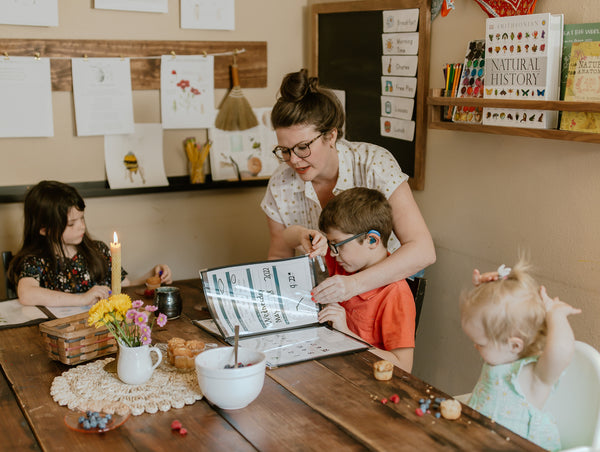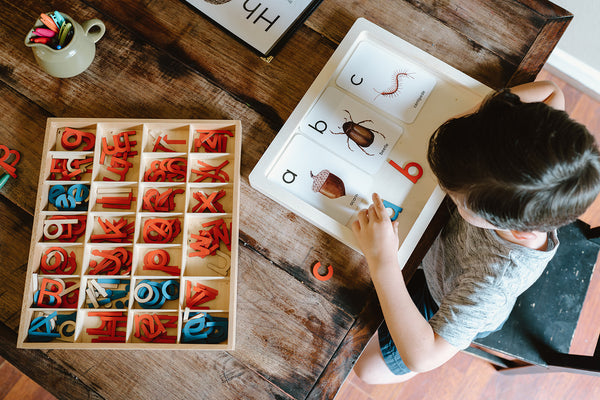In my years of homeschooling, I have learned there are seasons of time-intensive, creative, engaging, and rich homeschooling and there are other seasons of simply doing the basics. Early in my journey, I would feel guilty over these “bare bones” seasons, but now I accept that scaling back at times is simply a part of life.
As homeschool parents, we carry so many things. We often have pregnancies and babies, home transitions, sicknesses, and businesses. Things come our way that we weren’t expecting and our idealistic homeschool plans get derailed. I have learned to plan for these interruptions as much as possible and to expect them.
We recently went through one of these seasons as we finished building our home and moved in. Deadlines and expected move-in dates came and went, as challenges and delays came up with the build and inspections. We had packed up our home and were living out of boxes, just waiting for the green light to make the move. One month of waiting turned into several, and during this period we were only living with the necessities. I gave in to the reality that it was a season of minimal schooling. We relied on our online math curriculum and library books and took advantage of all of the life lessons along the way. Everything else was on hold.
In seasons like this, I am grateful we choose to homeschool year-round. I can take a deep breath, knowing we will return to the full swing of things soon and make up for lost time in the coming months.
Benefits of year-round homeschooling

In general, I believe there are many benefits to homeschooling year-round.
1. Greater flexibility in scheduling
Homeschooling year-round offers the flexibility to adapt schedules as needed during seasons of transition, unexpected changes, or burnout. It also allows families to take advantage of off-season travel or experiences by being able to take days here and there to do fun activities or visit new places. In my family, we can easily avoid crowds and premium prices by traveling on weekdays or in slow seasons.
2. Educational momentum
Homeschooling year-round helps continue the momentum of learning from one year to the next. Without huge breaks from school during the summer months, children start each year building on what they learned the year before, instead of needing weeks to review old lessons. In my family, we still take a short break between the end of summer and the start of a new school year, but we don’t skip over school for months at a time.
3. Consistent habit of learning
My home education focuses on seasonal rhythms, Biblical truth, living books, and intentional family connection. Learning is part of our family life. I believe that doing school consistently throughout the year (with breaks built in as needed) helps foster a love of learning for my children. My children are used to the habit of coming together to learn new subjects, read new books, and create together.
4. Schooling in rhythm with the seasons
In my family, we prioritize spending time in nature. Doing school year-round allows us to live with the rhythm of the seasons and take advantage of each season as it comes. With a schedule that ebbs and flows, we spend each Friday outdoors with our local nature group, and we take breaks throughout the year to take camping trips and experience the outdoors at different times. Instead of having breaks primarily during summertime, we take advantage of adventuring in the outdoors during fall, winter, and spring. Along with that, we love schooling in rhythm with the seasons, by learning through nature all year long.
Why we started homeschooling year-round
In 2022, with the growth of Treehouse Schoolhouse, I started working more hours and dedicating more time to writing curriculum and sharing resources with other homeschool families. At this point, I leaned into a year-round schedule to build in more time for myself to work and still give our homeschooling the time and dedication I wanted.
During this time in our lives, homeschooling year-round gave me the flexibility to ease our schedule when I prepped for a big product launch or needed more hours of writing. If I needed to, I would take a day off here and there to focus on work and jump back into school as soon as that project was complete. Plus, with two toddlers in the mix, schooling year-round allowed me to take a break when the school day got derailed, knowing we weren’t on a tight deadline to finish before summer. It felt so freeing to call school off on a day that a toddler was extra needy and lessons felt like pulling teeth.
I realized it was no big deal if we just continued working through our schoolwork at a slower pace, with breaks when we needed, and just continued through the summer. Alongside allowing some breathing room for our family, I found that extending school into the summertime gives us a good reason to be indoors during the hottest time of the year. I allow for more outdoor excursions, like day or weekend trips, during the fall, winter, and spring seasons when the temperatures are cooler and we can be outside for longer periods.
Related: Homeschooling Year-Round and Summer Daily Rhythm
Different ways to homeschool year-round

Year-round schooling does not mean always doing school or never taking breaks. For my family, schooling year-round allows us to have more breaks and special experiences that amplify our life and goals, including visiting extended family, spending more time in nature throughout the seasons, and allowing time for me to support my family through our business.
There are many ways to adopt a year-round schedule for your home school:
- Loosely plan out the number of school days or lessons you want to do each year. Log those lessons and when you finish, you are done. Some states require a certain amount of days of school a year. Find out more about what your state requires here.
- Choose how many days per week you are going to do school. For example, families may opt for a four- or five-day week. Map out how many weeks of school various schedules will take to reach the amount of days you want or need to do school.
- Plan out your year, including any travel or time off of school you want to take. Divide up the school year into units, semesters, quarters, or seasons, and see how you can break up your curriculum choices into these time frames.
- Incorporate rest by intentionally doing school for six weeks, followed by a one-week break. The six weeks on, one week off method allows time to rest, schedule appointments, plan playdates, and take a break from the rigor of homeschooling.
Related: Summer Homeschooling: 6 Rhythms for Intentional Summer Enrichment
How I plan a year-round homeschool schedule for our family

Personally, in our state, we are required to homeschool 180 days a year. I mark the days we do anything educational in my homeschool planner. Sometimes that is a formal lesson around the table and other times it’s a field trip to the zoo or a museum.
Related: Homeschool Planning 101
I am pretty laid back when it comes to planning for the year. I like to plan in small batches (four to six weeks at a time) and around our vacation schedule and holidays, factoring in any curriculum we are doing. Sometimes I schedule a break, but often I just decide when it’s time for one and we take it. Sometimes it’s a week off and others, just a day here and there. Sometimes we do some schoolwork, but not everything. Honestly, I just roll with it. We just don’t stick to any one method and it looks different year-to-year.
Easing back into a school rhythm

During our move into our new home this winter, I greatly missed the rhythm of our homeschool routine. As we settled in, I opted to start slowly, gradually adding subjects and curriculum so my children could find some enrichment among the chaos of our move and life transition.
Start small and build from there
While we were moving and unpacking, at some stages, my older two children (ages 9 and 10) continued their independent work lists. This is the work they can do with very little assistance. Currently, that is Teaching Textbooks math lessons, Fix It! Grammar, and reading a few chapters from their current chapter book.
Once I became a little more available, I started incorporating daily read-alouds. For my little ones, I spend 30 minutes to an hour each day reading from an assortment of picture books. Then over lunch, we read chapter books, which all four of my children enjoy. We are currently working through Charlie and the Chocolate Factory.
Related: Best Sources for Preschool & Elementary Living Book Lists and Current Read Alouds
When I was ready to dedicate our full mornings to homeschooling again, I rounded out our days with Morning Time using Treehouse Nature Study, some kindergarten work for my 5-year-old, and history and geography lessons for my older children.
Related: Our Homeschool Curriculum Choices for 3rd and 5th Grade
Mix up your routine or curriculum as needed
If part of your daily rhythm or curriculum is simply not working or no longer serves you, change it. Modify your schedule, set aside a curriculum your children are struggling with, or add something new and fun. Use a visual schedule to keep the family on the same page.
A fresh unit study can mix it up while still overlapping with many of your school subjects. Prep for Treehouse Nature Study: Spring or An Expectant Easter, and lift your spirits with new activities, books, and learning materials.
Unit studies, sometimes called thematic units or integrated studies, use a hands-on approach to add depth to a subject rather than just reading about a subject or reading a textbook. My preference is to apply Charlotte Mason principles to unit studies, and give my children the experience of learning through elements like:
- Folk songs
- Hand rhymes
- Picture study
- Booklists with fiction picture books, non-fiction picture books, and illustrated reference guides
- Hands-on activities
For example, Treehouse Nature Study: Spring features 13 weeks of learning for different themes of spring, including seeds and sprouts, rainbows, Spring Equinox, snails and worms, and more. For years we have returned to Treehouse Nature Study to explore the elements of nature in new and exciting ways that bring life and meaning to the seasons throughout the year.
Using ‘gameschooling’ to learn in action
I have found that “gameschooling” is a great way to enrich our regular homeschool studies when we are in seasons of transition. In addition to being no-prep, fun, and entertaining, there are so many games that emphasize subjects like math, science, language arts, and nature, while encouraging skills like creative thinking, logic, cooperation, and more.
Related: Best Educational Board and Card Games for Kids and Families
Give yourself grace and modify as needed

In my years of homeschooling, I have found that life will, without fail, interrupt and force me to adapt my plans. Implementing a year-round schedule has allowed me to focus on the needs of myself and my children through many seasons of life while maintaining our intentions and working towards our goals. Give yourself grace as you make plans for your school routine. If you need to take a break, give yourself the space to do so. If you need to modify your curriculum, give yourself the freedom to adapt as needed.
Related: 13 Ways to Beat the Winter Homeschool Blues
Do you homeschool year-round? Share your experiences in the comments below.

![Library Tips & Tricks for Homeschool Families [Free Booklist]](https://storage.googleapis.com/treehouse-schoolhouse-media-dev/d464b03b-img_9674_original.jpg)

